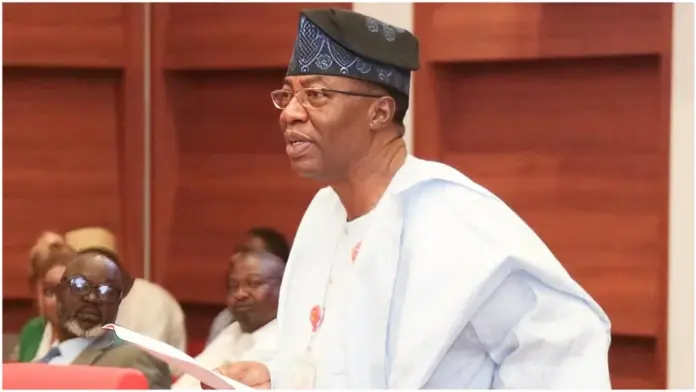The Chairman of the Senate Committee on Navy and Senator representing Ogun East, Otunba Gbenga Daniel, has warned that rapid population growth and uncontrolled migration have become the biggest security threats facing Nigeria’s Southwest region. He said these challenges are now more pressing than many of the violent crimes that often dominate national headlines.
Daniel made the remarks on Friday in Lagos at the Senate Ad-Hoc Committee on National Security Summit, organized in partnership with the Lagos State Government. The summit brought together top lawmakers, security chiefs, traditional rulers, and religious leaders to examine rising security concerns across the Southwest and to propose long-term solutions.
Speaking at the event, Daniel noted that the Southwest is often regarded as one of the more stable regions in Nigeria. Compared to the North-East, which has faced years of Boko Haram insurgency, or the North-West where banditry and mass kidnappings have become common, the Southwest is generally seen as relatively peaceful.
“When we look at the state of security in the nation, I think the Southwest has done considerably fairly, and that I believe is commendable,” he said.
However, the former Governor of Ogun State cautioned that this stability should not mislead anyone. According to him, the biggest danger now comes from internal pressures, especially the region’s fast-growing population and the continuous arrival of people from different parts of Nigeria and neighbouring countries.
Daniel described the current pace of migration into the Southwest as “unprecedented.” He explained that the region’s economic opportunities, better infrastructure, and urban development are drawing large numbers of migrants. While migration is normal in a vibrant society, he said the real problem is uncontrolled and unaccounted-for inflow.
He warned that many of those coming into the region do so without proper documentation, records, or any form of community integration. According to him, such a situation makes it difficult for security agencies to track criminal elements who may hide within the population.
“Population explosion remains the biggest challenge that plagues the Southwest,” he said. Although the region continues to deal with issues such as kidnapping, farmer-herder clashes, banditry, and occasional cases of terrorism, Daniel insisted that uncontrolled migration now poses a special risk that could worsen all other threats.
The Senator identified Lagos State as the centre of this population crisis. As Nigeria’s commercial capital, Lagos attracts millions of people seeking jobs, business opportunities, and better living conditions. Daniel described Lagos as “the most volatile” in terms of population pressure, noting that the city’s limited land mass and rapidly growing population create serious security and social concerns.
He added that neighbouring Ogun State, especially border communities near Lagos, is now experiencing similar pressures. Many people working in Lagos live in Ogun due to cheaper housing, causing a rapid rise in Ogun’s population as well. This, according to Daniel, means the migration challenge is no longer limited to Lagos alone but is spreading across the Southwest.
The Southwest region has generally been known for relative peace, strong economic activities, and active community policing structures such as the Amotekun Corps. However, the region has not been spared from rising cases of kidnapping, cult clashes, cybercrime, and violent robbery.
Security experts have long warned that population pressure, unemployment, poor urban planning, and migration without proper records can make crime more difficult to control. Cities like Lagos, Ibadan, Abeokuta, Akure, and Osogbo are also expanding rapidly, sometimes faster than government planning can accommodate.
In recent years, many residents and community leaders have raised concerns about the presence of unidentified persons settling in forests, abandoned buildings, and informal settlements. These concerns partly contributed to the creation of the Amotekun security outfit in 2020.
Daniel’s warning appears to align with these growing fears, placing population management at the center of the region’s security agenda.
To address the challenge, Daniel called for heavy investment in modern technology. According to him, advanced tools such as digital population databases, biometric tracking systems, surveillance cameras, and smart border monitoring devices can help governments and security agencies know who is living in the region and for what purpose.
He also highlighted the need for stronger infrastructure development, noting that proper roads, housing, transport systems, and public services will help states manage population growth more effectively. Without such infrastructure, he warned, growing urban centres could become hotspots for crime, social tension, and security breakdowns.
The summit, chaired by Senator Tokunbo Abiru, brought together a long list of stakeholders. Participants included lawmakers from across the Southwest, traditional rulers who play key roles in community-level security, religious leaders, and many security agencies.
Among those represented were the Nigerian Police Force, the Department of State Security (DSS), the Nigerian Army, the Nigerian Navy, the Lagos Neighbourhood Watch, and the Peace Corps of Nigeria. Their presence showed how seriously the government views the region’s security situation.
The meeting also highlighted a key point: security cannot be handled by the government alone. Effective solutions require community participation, improved intelligence gathering, and strong coordination between federal and state authorities.
The convergence of these groups and the warnings raised by Senator Daniel point to a broader understanding that the Southwest’s security threats are evolving. While traditional crimes like kidnapping and armed robbery still require attention, the deeper issue may be demographic changes that have gone unmanaged for too long.
Daniel urged leaders across the region to collaborate closely, share information, and adopt long-term strategies instead of short-term responses. He stressed that without immediate action, the population surge could overwhelm existing security systems and put millions of residents at risk.
As the Southwest continues to attract people from across the country, the challenge for policymakers is to balance economic growth with safety and stability. Daniel’s message serves as a reminder that security threats are not always loud or violent; sometimes, they grow quietly in the background until they become difficult to manage.

